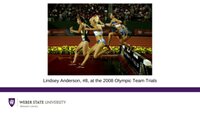| Title |
Anderson, Lindsey OH19_003 |
| Creator |
Weber State University, Stewart Library: Oral History Program. |
| Contributors |
Anderson, Lindsey, Interviewee; Tooker, Sarah, Interviewer |
| Description |
The Beyond Suffrage Project was initiated to examine the impact women have had on northern Utah. Weber State University explored and documented women past and present who have influenced the history of the community, the development of education, and are bringing the area forward for the next generation. The project looked at how the 19th Amendment gave women a voice and representation, and was the catalyst for the way women became involved in the progress of the local area. The project examines the 50 years (1870-1920) before the amendment, the decades to follow and how women are making history today. |
| Abstract |
The following is an oral history interview with Lindsey Anderson, condcuted on August 5, 2019 by Sarah Tooker. Lindsey discusses her life and her memories of Weber State University, and the impact of the 19th Amendement.; The following is a video clip of an oral history interview with Lindsey Anderson discussing the impact of the women receiving the right to vote. |
| Subject |
Universities and colleges--Athletics; Women in higher education; Women Olympic athletes--United States; Voting--United States; Women--suffrage |
| Keywords |
Track and Field; Olympic Trials; Female collegiate athletes |
| Digital Publisher |
Stewart Library, Weber State University, Ogden, Utah, United States of America |
| Date |
2019 |
| Date Digital |
2019 |
| Temporal Coverage |
1985; 1986; 1987; 1988; 1989; 1990; 1991; 1992; 1993; 1994; 1995; 1996; 1997; 1998; 1999; 2000; 2001; 2002; 2003; 2004; 2005; 2006; 2007; 2008; 2009; 2010; 2011; 2012; 2013; 2014; 2015; 2016; 2017; 2018; 2019 |
| Medium |
oral histories (literary genre) |
| Spatial Coverage |
Salem, Utah, Utah, United States, http://sws.geonames.org/5555097, 40.05301, -111.67354; Ogden, Weber County, Utah, United States, http://sws.geonames.org/11788968, 41.22809, -111.96766; Oasaka, Kita, Osaka City, Osaka, Japan, http://sws.geonames.org/1853909, 34.69374, 135.50218; Beijing, Beijing, China, http://sws.geonames.org/1816670, 39.9075, 116.39723; Twin Falls, Twin Falls, Idaho, United States, http://sws.geonames.org/5610810, 42.56297, -114.46087 |
| Type |
Text; Image/StillImage; Image/MovingImage |
| Access Extent |
PDF is 23 pages; Video Clip is an mp4, 74.3 MB |
| Conversion Specifications |
Recorded using a Marantz PMD660 Handheld Digital Audio Recorder and a Radioshack 33-3019 Unidirectional Dynamic Microphone. Transcribed using Express Scribe Transcription Software Pro 6.10 Copyright NCH Software. |
| Language |
eng |
| Rights |
Materials may be used for non-profit and educational purposes, please credit University Archives; Weber State University |
| Source |
Anderson, Lindsey OH19_003 Weber State University Archives |
| Format |
application/pdf; video/mp4 |
| ARK |
ark:/87278/s6jtbsgt |
| Setname |
wsu_bs_oh |
| ID |
105415 |
| Reference URL |
https://digital.weber.edu/ark:/87278/s6jtbsgt |
| Title |
Anderson, Lindsey OH19_003 |
| Creator |
Weber State University, Stewart Library: Oral History Program. |
| Contributors |
Anderson, Lindsey, Interviewee; Tooker, Sarah, Interviewer |
| Description |
The Beyond Suffrage Project was initiated to examine the impact women have had on northern Utah. Weber State University explored and documented women past and present who have influenced the history of the community, the development of education, and are bringing the area forward for the next generation. The project looked at how the 19th Amendment gave women a voice and representation, and was the catalyst for the way women became involved in the progress of the local area. The project examines the 50 years (1870-1920) before the amendment, the decades to follow and how women are making history today. |
| Abstract |
The following is an oral history interview with Lindsey Anderson, condcuted on August 5, 2019 by Sarah Tooker. Lindsey discusses her life and her memories of Weber State University, and the impact of the 19th Amendement. |
| Image Captions |
Lindsey Anderson at the 2008 Olympic Trials; Lindsey Anderson number 8 competing in the Olympic Trials; Lindsey Anderson number 8 competing in the 2008 Olympic Trials; Lindsey Anderson Circa 2010 |
| Subject |
Universities and colleges--Athletics; Women in higher education; Women Olympic athletes--United States; Voting--United States; Women--suffrage |
| Keywords |
Track and Field; Olympic Trials; Female collegiate athletes |
| Digital Publisher |
Stewart Library, Weber State University, Ogden, Utah, United States of America |
| Date Digital |
2019 |
| Temporal Coverage |
1985; 1986; 1987; 1988; 1989; 1990; 1991; 1992; 1993; 1994; 1995; 1996; 1997; 1998; 1999; 2000; 2001; 2002; 2003; 2004; 2005; 2006; 2007; 2008; 2009; 2010; 2011; 2012; 2013; 2014; 2015; 2016; 2017; 2018; 2019 |
| Medium |
oral histories (literary genre) |
| Spatial Coverage |
Salem, Utah, Utah, United States, http://sws.geonames.org/5555097, 40.05301, -111.67354; Ogden, Weber County, Utah, United States, http://sws.geonames.org/11788968, 41.22809, -111.96766; Oasaka, Kita, Osaka City, Osaka, Japan, http://sws.geonames.org/1853909, 34.69374, 135.50218; Beijing, Beijing, China, http://sws.geonames.org/1816670, 39.9075, 116.39723; Twin Falls, Twin Falls, Idaho, United States, http://sws.geonames.org/5610810, 42.56297, -114.46087 |
| Type |
Text; Image/StillImage |
| Access Extent |
PDF is 23 pages |
| Language |
eng |
| Rights |
Materials may be used for non-profit and educational purposes, please credit University Archives; Weber State University |
| Source |
Anderson, Lindsey OH19_003 Weber State University Archives |
| Format |
application/pdf |
| Setname |
wsu_bs_oh |
| ID |
105519 |
| Reference URL |
https://digital.weber.edu/ark:/87278/s6jtbsgt/105519 |





